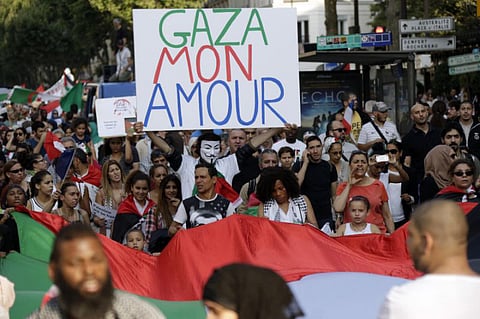Palestine 2018: Mission being accomplished
Palestinians may be pauperised and starved, but they are gaining support globally

Lexicographers are not the drudges we imagine them to be, gofers who merely compile, edit and write dictionaries, but astute monitors of those semantic fashions of expression that define the inward preoccupations of our culture.
Last week, the Oxford American Dictionary revealed that, for 2018, it had selected ‘toxic’ as its standout choice for Word of the Year, while Merriam-Webster opted for ‘justice’. The former derives from the Latin ‘toxicus’ (poisoned) and alludes to a poisoned arrow shot at someone whom you intend to mortally wound. The latter, also from Latin, ‘justia’, has of course well-known meanings that range from the legal and technical to the moral and philosophical.
As I sit here, a Palestinian trying to judge events of the past 12 months in his people’s struggle, and judge them according to his bent of spirit as an exile, I find ‘toxic’ and ‘justice’ fitting words to book-end the year 2018, a year that had a tumultuous beginning marked by a virulent assault on one of the most sacred claims in the Palestinian people’s historical canon, and a poignant end imbued with moral optimism and an assured sense of the deep meaning of that struggle to millions of people around the world.
The year opened with the dread realisation, which began to dawn on Palestinians weeks after the fact that the American administration had chosen to recognise [occupied] Jerusalem as Israel’s capital and that their ancestral, cherished city was now “off the table” — an event as injurious and a diktat as arbitrary as the Balfour Declaration. Just as the British a century earlier had robbed Palestinians of home and homeland, so did, in like manner, Americans rob them of their City. And for Palestinians, there is no other coordinate of cultural reference that touches so urgently on their lives, their culture, their history than Jerusalem.
Not again! Yes, again. And given the fact that the Arab world’s response to the provocation was muted, it seemed as if a fist was closing tight around their already choked psyche. The toxin in the poisoned arrow had hit its mark.
But ordinary Palestinians have a way about them, a way about how they respond in a teleological manner to challenges in their history. (By contrast, Palestinian leaders are always out to lunch, speaking a language mockingly remote to that spoken by the people they pretend to lead.) Thus, weeks before the American embassy opened in occupied Jerusalem, in May, the Great March for the Return erupted, evincing the same captivating elan as the Intifada three decades earlier, declaring the same message: We are militarily occupied, but not spiritually cowed.
Heirs to the legacy of a century of struggle against colonial rule, they seemed to be saying that the deepest energies of the Palestinian soul were always expressed in struggle. Later in the year, America, a superpower, showed that it was not taking lip-service from a recalcitrant people who effectively were telling the American president they intended to have nothing to do with him, peace process or no peace process. The vindictive response from that president was swift: Pauperise and starve these Palestinian upstarts and, where possible, strip them of their status as refugees. Slash the funds provided to them by the United Nations, the US Agency for International Development and whoever else you can track down. Cut them down to size and bring them to the negotiating table like mendicants, with hat in hand, and have them sign the “deal of the century”.
Well into the last month of 2018, and the US administration’s goal had not been reached.
Pauperised and starved, yes, but the Palestinians were not about to pay with the price of their own national dignity. Moreover, they were gaining yet more popular support globally, where folks saw them as acting out their cause with lyric power and unfailing subtlety, while Israel was acting out its own through use of the code of the apartheid bully, the unrepentant hoodlum and the international pariah.
On December 16, as if to close the year on a note of grace — on an affirmation of justice — London hosted one of the biggest festivals ever held there in celebration of the struggle for Palestinian freedom, with more than 3,000 attendees, all touching base with a variety of exhibitions showcasing Palestinian art, music, poetry and other cultural effusions. Group ecstasy, I was told, defined the event.
There is much in the Palestinian struggle, and in how that struggle is lived by Palestinians themselves, that matches the symbolic forms and ironies of tragic art. And who can resist the strange and complex idea of a people who, in 12 short months, were able to re-enact their private anguish on a public stage?
Fawaz Turki is a journalist, lecturer and author based in Washington. He is the author of The Disinherited: Journal of a Palestinian Exile.



